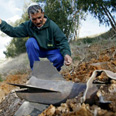
An uncertain calm rests upon Sderot at the moment. The sounds of war have disappeared, replaced by the sounds of a city slowly coming back to life. The click of the intercom followed by the voice that repeatedly stated “Color Red,” followed by the rocket explosion a few seconds later seems to be something of the past.
But daily news reports on Palestinian terror activity from Gaza are constant reminders to Israelis in Sderot and the western Negev that the calm remains seemingly temporarily.
Israel declared a unilateral ceasefire on Saturday night, January 17 at 2:00 am, which effectively ended Operation Cast Lead, a 3-week offensive against Hamas. It was Israel's longest offensive against Hamas in the Gaza Strip, following two brief military offensives in 2004 and 2006 in response to Qassam attacks that killed two Israeli children and sent several other civilians into shock.
On Tuesday, January 20, two day after the ceasefire was declared, Palestinian terrorists fired eight mortar shells at Israel. Palestinian militants also opened fire on IDF soldiers in Gaza. By Tuesday evening, the last of the IDF troops had pulled out of Gaza before the inauguration of US President Barack Obama at 6 pm Israel time.
On Tuesday, January 27, Palestinian terrorists carried out the first deadly attack on Israel since the ceasefire went into effect. An Israeli soldier was killed when an explosive device planted at the Kissufim crossing along the Gaza Strip border exploded as an IDF force patrolled the area. Another officer was seriously injured, with one leg amputated and another leg severely damaged. Two other soldiers, categorized as lightly hurt, suffered extensive shrapnel wounds.
IDF sources stated that it was possible that the attack was not carried out by Hamas, but rather, by other Palestinian terror groups. However, government spokesman Mark Regev told AP that "Hamas unfortunately controls the Gaza Strip and is directly responsible for all hostile fire from Gaza into Israel." He called the attack "a deliberate act of provocation designed to undermine and torpedo the calm."
Smuggling efforts continue
Also on Wednesday, a Qassam rocket fired from Gaza slammed into the western Negev, wounding no one. On Thursday, January 29, Sderot residents woke up to the sound of the Color Red alert around 5 am, followed by a rocket explosion. The Qassam fell in an open field outside Sderot. This past weekend saw a volley of Qassam rockets fired at the western Negev, with one Grad rocket hitting the southern outskirts of Ashkelon. Another rocket landed beside an empty kindergarten in Eshkol.
Last week IDF forces pounded smuggling tunnels under Gaza's border with Egypt. According to Israeli intelligence, Hamas employed an estimated 250 tunnels on the Rafah border with Egypt. Approximately 80 percent of these tunnels had collapsed or were damaged in Air Force raids during Operation Cast Lead according to a Haaretz article published in Haaretz. According to the article, Hamas holds approximately 2,000 to 3,000 rockets, of which 1,200 rockets were destroyed by the IDF during the operation.
However, smuggling tunnels that remained undamaged in the war were speedily put into use hours after the IDF completed its withdrawal from Gaza. AP television news footage showed, on January 21, Palestinian workers busy clearing blocked tunnels and bulldozers carrying out repairs, while petrol that had been smuggled through from Egypt was being used to fill a fuel truck.
The amounts of arms, weapons, and rockets smuggled through the Gaza-Egyptian border dramatically increased after Israel disengaged from the Gaza Strip in August 2005. Thousands of guns, several hundred antitank rocket launchers, thousands of antitank rockets, and tons of explosives and antiaircraft missiles have entered into the Gaza Strip.
Indeed, AP News reported on January 28 that President Barack Obama's new Mideast envoy, George Mitchell, who made Israel his second stop in the Mideast after Egypt, stated that the long-term Gaza truce must be based on an end to weapons smuggling by Hamas and the re-opening of the territory's blockaded borders.
Sderot residents can only wait and anticipate what this next ceasefire brings.
International Correspondent Anav Silverman, Sderot Media Center















